| Author |
Message |
|
Robert Hinds
|
 Posted: Wed 20 Apr, 2011 8:24 am Post subject: Wool or linen Doublet? Posted: Wed 20 Apr, 2011 8:24 am Post subject: Wool or linen Doublet? |
 |
|
Hello,
I'm planning on ordering a doublet from HE soon but I'm not sure which material would be more accurate for my portrayal.
So my question is this: would a knights doublet have been made from wool or from linen and would a common soldiers doublet have been made more often in one or the other?
It's kind of a double question because right now I'm portraying a 1471 english billman, but I plan on upgrading to an english knight/man-at-arms of the same period in a few years. And I would rather save some money and use the same soft kit for both if thats possible. If not then my soft kit will just be knight quality.
Thanks in advance for your replys. 
"Young knight, learn to love God and revere women; thus your honor will grow. Practice knighthood and learn the Art that dignifies you, and brings you honor in wars." -Johannes Liechtenauer
"...And he that hath no sword, let him sell his garment, and buy one..." Luke 22:36
|
|
  |
 |
Glennan Carnie

|
 Posted: Wed 20 Apr, 2011 8:51 am Post subject: Posted: Wed 20 Apr, 2011 8:51 am Post subject: |
 |
|
First thing to consider: a knight was in the top 5% of the population in terms of wealth (typically). So they have plenty of income.
Second thing: Is this for wearing under armour, or wearing under a gown? A knight almost certainly had more than one doublet.
Third: Both the knight and a peasant may both have wool doublets; but that doesn't mean they were the same garment. The quality or wool and/or dye of the knight's doublet would be far better than the peasant's.
For want of a better analogy, knights were the millionaire playboys of their day. They had wealth, they had land, they had prestige. They were NOBILITY. And they dressed the part. Even more so by the end of the fifteenth Century, as the newly-rising merchant class was approaching (and in some cases exceeding) their wealth.
(Accurately) portraying a knight, therefore, means more than just slapping a few bits of plate on yourself.
If you want a knight's doublet, ignore off-the-peg offerings. Get yourself a tailor-made doublet in the finest worsted or silk you can afford. Also get yourself a second doublet - again properly tailored - to wearing under your harness (I hesitate to use the phrase 'arming doublet')
Basically, the more money you can spend, the more accurate your portrayal will look.
|
|
  |
 |
Sean Flynt

|
 Posted: Wed 20 Apr, 2011 8:52 am Post subject: Posted: Wed 20 Apr, 2011 8:52 am Post subject: |
 |
|
If you don't already have it, download this outstanding resource from The Company of St. George:
http://www.companie-of-st-george.ch/cms/?q=en...e-released
You might be able to get away with good hose, good shoes, linen arming doublet and good livery coat (in addition to shirt and braes, of course.) You could dress up that kit with armour and accessories to denote higher status and not have to add to your soft kit at all. Just get the coat large enough to fit over whatever items of harness you plan to buy.
I have similar interests, and I think this is the route I'd go. It seems to be a reasonable balance between authenticity and versatility. Personally, I'd probably sacrifice invisible authenticity and make a light sleeveless doublet to hold the hose and wear a jack or livery coat over that--keeping the majority of my investment in the open and not boiling to death in multiple layers of wool. Check out HE's "pourpoint" for that inexpensive alternative: http://historicenterprises.com/pourpoint-14th...ath=99_109
-Sean
Author of the Little Hammer novel
https://www.amazon.com/Little-Hammer-Sean-Flynt/dp/B08XN7HZ82/ref=sr_1_1?dchild=1&keywords=little+hammer+book&qid=1627482034&sr=8-1
|
|
   |
 |
Thomas R.

|
 Posted: Wed 20 Apr, 2011 10:09 am Post subject: Posted: Wed 20 Apr, 2011 10:09 am Post subject: |
 |
|
As the term "doublet" says, it's made of two layers: wool on the outside, linnen on the inside. And that makes sense during the warm and the cold season. You will sweat through the linnen which will cool you, the wool then absorbs the sweat and will hold you nevertheless warm. The idea to be completely dry for feeliing comfortable (even during sports and exercises!) is fairly modern. So: let's sweat!  (and stink!) (and stink!)
http://maerenundlobebaeren.tumblr.com/
|
|
   |
 |
|
Robert Hinds
|
 Posted: Wed 20 Apr, 2011 1:53 pm Post subject: Posted: Wed 20 Apr, 2011 1:53 pm Post subject: |
 |
|
Thanks for the reply's. 
Glennan: It's not for wearing under armour or a gown. We have hot and humid summers here so my plan is to change into my civilian kit, from my armour, if it gets too hot. I'm planning on getting the mahoitred doublet from HE, and the XS size fits my measurements perfectly. From my understanding HE has some of the most accurate clothing out there so I thought it would be a good choice. I don't know anywhere else where I could get a tailor made doublet anyways. HE offers custom sizing but that would be pointless since the XS would fit me perfectly... Another issue is cost. While I would like to spend a lot on my kit, I'm already taking flak from friends and family about me spending what to them seems too much for 400 year old clothes... I am planning on getting an arming doublet in the future for wearing under harness, but that has to wait for awhile.
You mentioned worsted wool and silk, which would be the most appropriate (and cool) for a middle to low spectrum knight (in other words not a great lord, but of average or below average in knightly wealth)?
Sean: Thanks, I actually already have that guide. Ironically my Pourpoint arrived yesterday along with my hose, brais and shirt. I really like it and I do plan to wear it under my jack. I also have plans to order a livery jacket this summer, albeit a sleeveless one. Great minds think alike. 
Thomas: Thanks for that information. I actually did not know why it was called a doublet and that that was how it worked. 
By the way does anyone have an opinion of the HE Mahoitred doublet?
"Young knight, learn to love God and revere women; thus your honor will grow. Practice knighthood and learn the Art that dignifies you, and brings you honor in wars." -Johannes Liechtenauer
"...And he that hath no sword, let him sell his garment, and buy one..." Luke 22:36
|
|
  |
 |
Chuck Russell

|
 Posted: Wed 20 Apr, 2011 3:04 pm Post subject: Posted: Wed 20 Apr, 2011 3:04 pm Post subject: |
 |
|
if u are not going to wear it under a gown then u need to wear a livery over it. other wise your in your underware so to speak.
wool doublet. i dont know of any sources that site linen ones other than arming doublets
|
|
    |
 |
|
Robert Hinds
|
 Posted: Wed 20 Apr, 2011 3:45 pm Post subject: Posted: Wed 20 Apr, 2011 3:45 pm Post subject: |
 |
|
| Chuck Russell wrote: | if u are not going to wear it under a gown then u need to wear a livery over it. other wise your in your underware so to speak.
wool doublet. i dont know of any sources that site linen ones other than arming doublets |
Whoa I didn't know that... So wearing a doublet without a gown or livery is like wearing just underwear?
What about the central guy in this image? That's considered "underwear' so to speak?
 Attachment: 154.55 KB Attachment: 154.55 KB
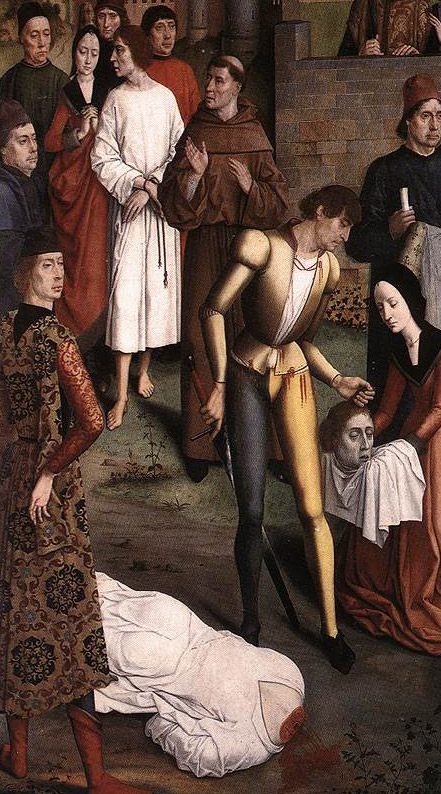
"Young knight, learn to love God and revere women; thus your honor will grow. Practice knighthood and learn the Art that dignifies you, and brings you honor in wars." -Johannes Liechtenauer
"...And he that hath no sword, let him sell his garment, and buy one..." Luke 22:36
|
|
  |
 |
Chuck Russell

|
 Posted: Wed 20 Apr, 2011 6:26 pm Post subject: Posted: Wed 20 Apr, 2011 6:26 pm Post subject: |
 |
|
he's working a dirty job. dont wanna get blood all over your proper gown now do you? 
|
|
    |
 |
|
Robert Hinds
|
 Posted: Wed 20 Apr, 2011 6:57 pm Post subject: Posted: Wed 20 Apr, 2011 6:57 pm Post subject: |
 |
|
I did not know the doublet was considered an under garment...
Chuck could you (or someone) maybe post some pics and/or some information about gowns please? I've always thought the doublet was the basic top garment...
"Young knight, learn to love God and revere women; thus your honor will grow. Practice knighthood and learn the Art that dignifies you, and brings you honor in wars." -Johannes Liechtenauer
"...And he that hath no sword, let him sell his garment, and buy one..." Luke 22:36
|
|
  |
 |
Glennan Carnie

|
 Posted: Thu 21 Apr, 2011 12:51 am Post subject: Posted: Thu 21 Apr, 2011 12:51 am Post subject: |
 |
|
Medieval clothing was not only different in cut, but was worn differently. People didn't wear different outfits for different occasions like we do today. People dressed in layers. There were three basic layers:
Underwear, or body linens. Everyone wore a shirt and breaches/braies, regardless of status. The linens were there to protect your outer layers of clothing from your sweat and dirt. Walking around in public in your underwear, then as now, was just not done.
Foundation garments. These are the basic clothes - something to cover the body and something to cover the legs. For the body it would be a doublet. For the legs hose were worn.
A point to not about doublets and tailoring: until very recently clothing was fitted to the 'natural waist' - that is, the point at which the body bends. For most men this is just below the ribcage; or about elbow height. The waistline of the doublet (not the peplum / skirt) should sit at the natural waist, NOT at the modern waist (at the hips).
This can be seen in period art, but is often misinterpreted since medieval artists tended to compress the distance between natural waist and groin (presumably to make the legs look even longer). Have a look at the image above for a great example.
Outer garments. The outer garments showed everyone who and what you were. The outer garments showed status. The more money you had the more sumptuous your outer garments were. Everyone had some sort of outer garment. Of course, it wasn't worn all the time; for example if you were doing hard physical labour, when you would strip to your foundation garments.
If you want to wear period clothing you should have underwear, foundation garments and an outer garment of some sort. What style those garments take depends on the time period:
Please(!) avoid the re-enactorism of wandering around in just a shirt, belt, baggy joined hose and a hood. That's just made-up fantasy rubbish. Even though you see it ALL THE TIME.
|
|
  |
 |
Sean Flynt

|
|
   |
 |
|
Zac Evans
|
 Posted: Thu 21 Apr, 2011 6:55 am Post subject: Posted: Thu 21 Apr, 2011 6:55 am Post subject: |
 |
|
| Sean Flynt wrote: | | German and Austrian artwork of the period frequently shows soldiers or civic guards in just doublet and hose, but if you want the English style you should probably look to the Beauchamp Pageant. |
I always interpreted that as a tighter style of gown, worn over a doublet. Sometimes these were sleeveless, but generally they look too long in the body to be doublets.
linked due to size.
Here's an example. Still wearing coats, but very tight, over their doublets.
As you say though, English chaps would have a different style and would always be wearing their cotes/gowns.
As for the OP, I would recommend getting a simple wool doublet with little or no puff in the sleeve. A well done man at arms kit looks a lot better than a poorly done knights kit. As an example, my early knight impression:

Looks stupid, compared to my spear-man impression:

Both probably cost about the same to do, and the spearman has a lot less in the way of armour, but I think it looks better, because it looks more accurate (not completely, mark you).
Zac
|
|
  |
 |
Sean Flynt

|
 Posted: Thu 21 Apr, 2011 7:48 am Post subject: Posted: Thu 21 Apr, 2011 7:48 am Post subject: |
 |
|
The housebook examples are definitely gowns and those appear to be in the majority. I'm thinking of examples like those below which are, admittedly, later in the century (ca. 1480-1500). It's not clear if all of these are pointed to the hose but it's often very clear that there's nothing beneath other than the shirt. A loose belted garment that I would call a very light gown (appearing to be the weight of shirting) seems to have been very popular in this period/culture, and there are some examples of that below. Execution/torture scenes are always problematic because manual laborers are often shown in only doublet and hose. In some cases, though, men not directly participating in the dirty work are shown without gown. In some cases the figures without gowns have decorated doublets, which suggests outerwear more than underwear.
 Attachment: 213.02 KB Attachment: 213.02 KB
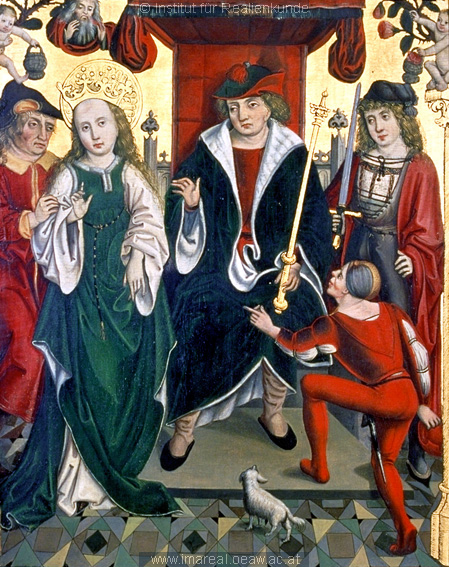
 Attachment: 205.68 KB Attachment: 205.68 KB
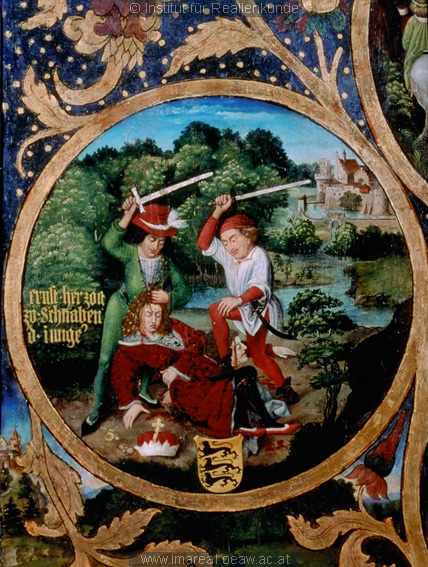
 Attachment: 195.91 KB Attachment: 195.91 KB
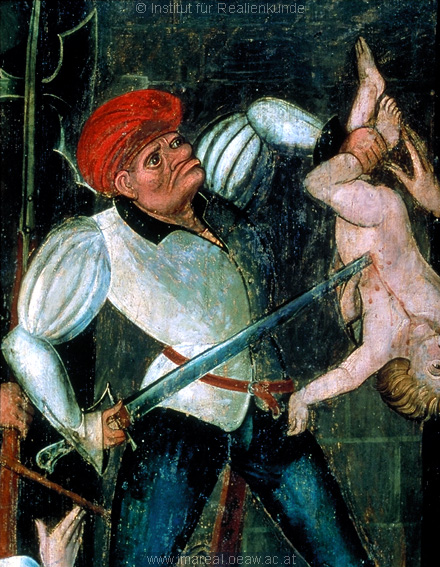
 Attachment: 213.86 KB Attachment: 213.86 KB
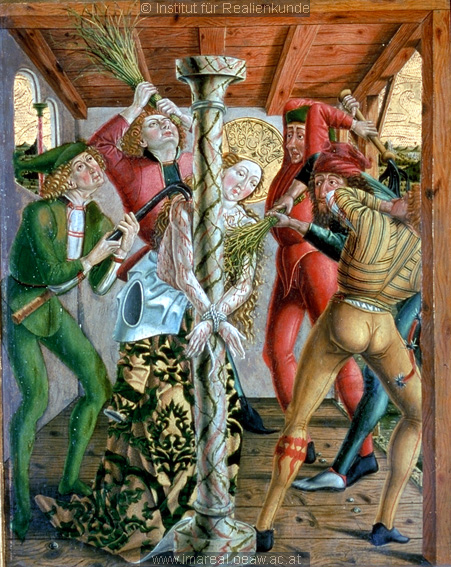
 Attachment: 145.26 KB Attachment: 145.26 KB
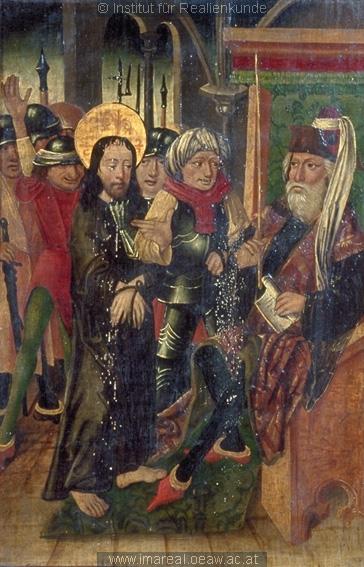
 Attachment: 195.57 KB Attachment: 195.57 KB
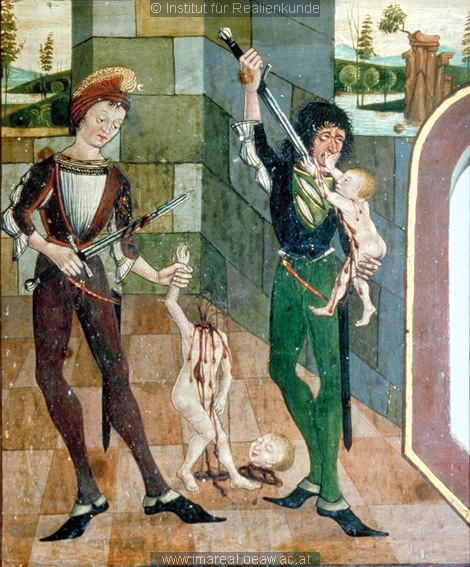
 Attachment: 242.78 KB Attachment: 242.78 KB
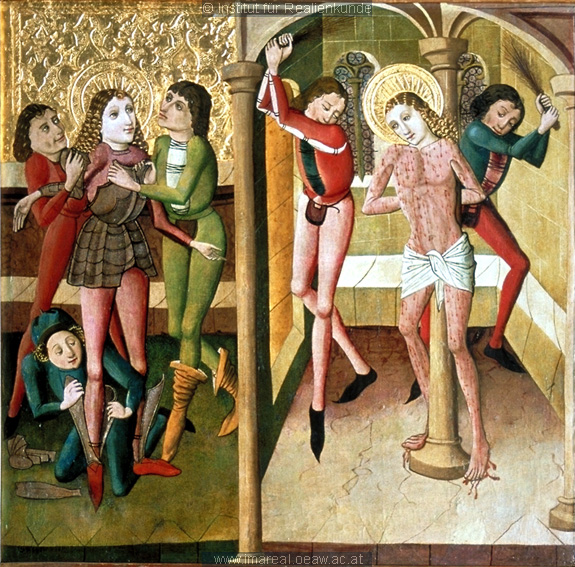
 Attachment: 135.4 KB Attachment: 135.4 KB
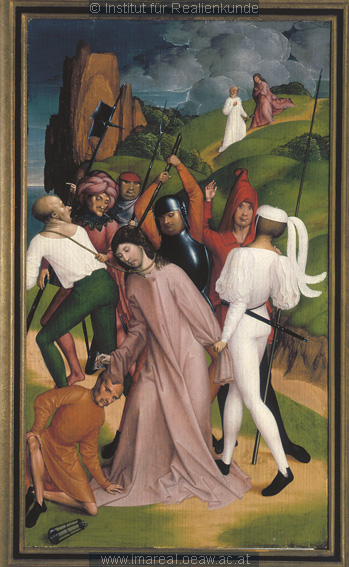
-Sean
Author of the Little Hammer novel
https://www.amazon.com/Little-Hammer-Sean-Flynt/dp/B08XN7HZ82/ref=sr_1_1?dchild=1&keywords=little+hammer+book&qid=1627482034&sr=8-1
|
|
   |
 |
|
Robert Hinds
|
 Posted: Thu 21 Apr, 2011 7:56 am Post subject: Posted: Thu 21 Apr, 2011 7:56 am Post subject: |
 |
|
Thanks for the information about gowns Glennan.
That is a very nice spearman kit Zac.
Now I have 2 new questions:
1: If it was really hot wouldnt someone have removed their gown if they were travelling or walking around town?
2: Is a gown also called a cote/coat? And if so would this coat sold by HE be considered a gown?
http://historicenterprises.com/coat-pleated-1...ath=99_109
"Young knight, learn to love God and revere women; thus your honor will grow. Practice knighthood and learn the Art that dignifies you, and brings you honor in wars." -Johannes Liechtenauer
"...And he that hath no sword, let him sell his garment, and buy one..." Luke 22:36
|
|
  |
 |
|
Zac Evans
|
 Posted: Thu 21 Apr, 2011 8:44 am Post subject: Posted: Thu 21 Apr, 2011 8:44 am Post subject: |
 |
|
| Robert Hinds wrote: |
Now I have 2 new questions:
1: If it was really hot wouldn't someone have removed their gown if they were traveling or walking around town?
2: Is a gown also called a cote/coat? And if so would this coat sold by HE be considered a gown?
|
1: No, not in the late 15th century. It's a different mentality. It would be equivalent to a Victorian gentleman walking around town in his shirt sleeves, without a jacket. Just not done.
2: Yes. The terms tend to be interchangeable. Some would describe a Gown as posher and longer, while a coat may be shorter and less rich, although this is open to discussion, and not, as far as I know, a historical distinction. That Cote by HE could also be described as a gown, although I prefer the ones that they do without damask patterns on. I think Damasks are overused in re-enacting circles, as they are shorthand for rich, but actually many knights would wear high quality wools, or imported satins without pattern.
Sean: Those guys look a lot like proto landshnechts to me. I note as well that they all appear to be up to no good, except for the first one (who does look a bit weird) and the guys arming up the saint in the second from the bottom. Is it possible that we're being told that these guys are a rotten lot in the medieval shorthand of "they're not even wearing coats!".
Zac
|
|
  |
 |
|
Lafayette C Curtis
|
 Posted: Thu 21 Apr, 2011 8:53 am Post subject: Posted: Thu 21 Apr, 2011 8:53 am Post subject: |
 |
|
| Zac Evans wrote: | | A well done man at arms kit looks a lot better than a poorly done knights kit. |
The only problem being that, from a medieval military perspective, "man-at-arms" and "knight" were almost identical...
(Just had to point out that "man-at-arms" was the term used for the elite back then, not for the common soldiers.)
Anyway, about the doublets: couldn't they be the white T-shirt of their era? After all, before Marlon Brando, exposure of the T-shirt was considered shockingly inappropriate, but now many people feel nothing wrong about walking around in nothing more than a T-shirt and jeans. So the doublet might have been a very real example of the "underwear as outerwear" phenomenon some four centuries before Brando.
|
|
  |
 |
Sean Flynt

|
 Posted: Thu 21 Apr, 2011 12:01 pm Post subject: Posted: Thu 21 Apr, 2011 12:01 pm Post subject: |
 |
|
| Lafayette C Curtis wrote: |
Anyway, about the doublets: couldn't they be the white T-shirt of their era? After all, before Marlon Brando, exposure of the T-shirt was considered shockingly inappropriate, but now many people feel nothing wrong about walking around in nothing more than a T-shirt and jeans. So the doublet might have been a very real example of the "underwear as outerwear" phenomenon some four centuries before Brando. |
I suspect there's something like that going on in the case of those very close-fitting doublets in the images I posted, transitioning to 16th fashions.
-Sean
Author of the Little Hammer novel
https://www.amazon.com/Little-Hammer-Sean-Flynt/dp/B08XN7HZ82/ref=sr_1_1?dchild=1&keywords=little+hammer+book&qid=1627482034&sr=8-1
|
|
   |
 |
|
Robert Hinds
|
 Posted: Thu 21 Apr, 2011 2:59 pm Post subject: Posted: Thu 21 Apr, 2011 2:59 pm Post subject: |
 |
|
Zac thanks for answering my questions, and I agree I don't really like the damask/brocade stuff they have on the coats they show either.
Maybe I can use the "white T-shirt" theory to explain why I have no coat/gown 'till I have enough money to buy one.  After all I'm already going to be walking around with a longsword, which wasn't commonly done, so I'm obviously looking for trouble. After all I'm already going to be walking around with a longsword, which wasn't commonly done, so I'm obviously looking for trouble. 
I'm going to be a 19 yr. old walking through town with a longsword. And worst of all...I have no coat, I mean trouble. 
"Young knight, learn to love God and revere women; thus your honor will grow. Practice knighthood and learn the Art that dignifies you, and brings you honor in wars." -Johannes Liechtenauer
"...And he that hath no sword, let him sell his garment, and buy one..." Luke 22:36
|
|
  |
 |
|
N Cioran
Location: Toronto Joined: 21 Nov 2010
Posts: 72
|
 Posted: Thu 21 Apr, 2011 7:57 pm Post subject: Posted: Thu 21 Apr, 2011 7:57 pm Post subject: |
 |
|
>I'm going to be a 19 yr. old walking through town with a longsword. And worst of all...I have no coat, I mean trouble.
Actually, you'd just get arrested. There's a nice thread somewhere about the ordinances forbidding doing just that sort of thing, and stiff fines to go with them...
So, walk around with a dagger 
Cole
|
|
  |
 |
|
Robert Hinds
|
 Posted: Thu 21 Apr, 2011 8:11 pm Post subject: Posted: Thu 21 Apr, 2011 8:11 pm Post subject: |
 |
|
| N Cioran wrote: | >I'm going to be a 19 yr. old walking through town with a longsword. And worst of all...I have no coat, I mean trouble.
Actually, you'd just get arrested. There's a nice thread somewhere about the ordinances forbidding doing just that sort of thing, and stiff fines to go with them...
So, walk around with a dagger 
Cole |
Someone mentioned on another thread (possibly the one you mentioned) that although they had laws about that sort of thing you would only get arrested if you drew it, otherwise you were fine.
Don't worry I'll be walking around with a dagger too. 
"Young knight, learn to love God and revere women; thus your honor will grow. Practice knighthood and learn the Art that dignifies you, and brings you honor in wars." -Johannes Liechtenauer
"...And he that hath no sword, let him sell his garment, and buy one..." Luke 22:36
|
|
  |
 |
|
|
You cannot post new topics in this forum
You cannot reply to topics in this forum
You cannot edit your posts in this forum
You cannot delete your posts in this forum
You cannot vote in polls in this forum
You cannot attach files in this forum
You can download files in this forum
|
All contents © Copyright 2003-2026 myArmoury.com — All rights reserved
Discussion forums powered by phpBB © The phpBB Group
Switch to the Basic Low-bandwidth Version of the forum
|

